Faults slowly, skillfully transforms from one kind of movie to another

At first glance, Faults appears to be a cringeworthy comedy of embarrassment in the tradition of Larry David and Ricky Gervais. Its protagonist, Dr. Ansel Roth (stalwart character actor Leland Orser, taking magnificent advantage of a rare leading role), is introduced attempting to pay for a hotel meal using a recycled voucher that he fished out of the trash; while he bills himself as one of the world’s foremost authorities on cults, his lectures on the subject serve as little more than an excuse to browbeat attendees into buying his latest book (Follower: Inside The Mind Of The Controlled), which he then charges them an additional $5 to sign. These overly broad early scenes, however, turn out to be misdirection on the part of writer-director Riley Stearns, who has something a lot more subtle and serious up his sleeve. Working with his wife, actress Mary Elizabeth Winstead (who also co-produced), he’s fashioned a movie that undergoes a slow, captivating metamorphosis, scene by scene, though who’s the caterpillar and who’s the cocoon remains unclear until the very end.
By his own admission, Ansel doesn’t really give a shit about his profession anymore, except as a meager meal ticket. He’s so broke and in debt, however, that he can’t resist the opportunity to demand a huge fee when a middle-aged married couple (Beth Grant and Chris Ellis) begs him to help their daughter, Claire (Winstead), who’s in the clutches of an organization that calls itself Faults. Ansel hires a couple of goons to help him grab Claire on the street and transport her to a seedy motel room, where he promises her that she can go wherever she wants if she’ll just agree to talk to him—and to her parents, occupying an adjacent room—for five days. So begins an epic deprogramming session, during which Ansel reveals himself to be genuinely expert at what he does, despite his general buffoonery, while Claire proves a remarkably cagey adversary. Orser and Winstead make a splendid duo, skillfully playing off each other’s rhythm: he quietly insistent with bursts of anxiety, she maddeningly serene with episodes of self-doubt. Every scene in which they’re alone together (which is a good chunk of the movie) crackles with electricity.
What holds Faults back from being truly great is the rickety apparatus Stearns has constructed to support this pas de deux. Improbably, Ansel owes a lot of money to his manager, Terry (Jon Gries); even more improbably, Terry—who, again, is a literary agent or some job title to that effect—employs muscle (Lance Reddick) to follow Ansel around issuing steely threats about what will happen if he doesn’t pay up soon. All of this material is silly, and its function in the movie’s endgame doesn’t justify the preposterous tedium of the scenes themselves. Likewise, allusions to a deprogramming disaster in Ansel’s past, while not as risible, tend to call unwanted attention to machinations that are meant to be happening behind the scenes. In its broad strokes, Faults turns out to be very similar to the feature debut of another, far better-known filmmaker, except that Stearns isn’t nearly as skilled at covering his tracks. (To say more would spoil the fun; for those who want a suspicion-confirming hint, though, think Roger Ebert favorite from the late 1980s.) Still, getting as close to that model as Stearns, Winstead, and Orser do is very impressive.